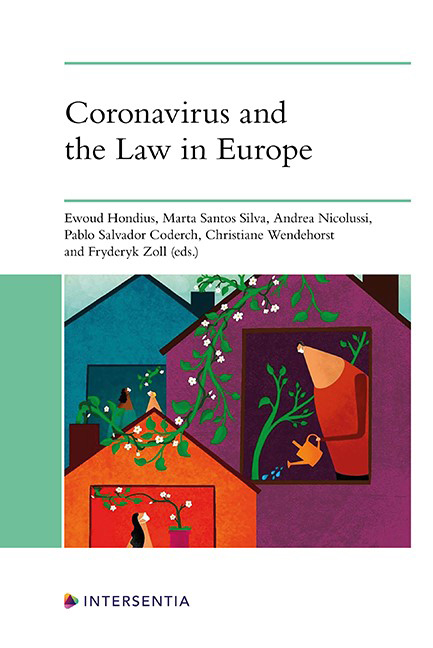Book contents
- Frontmatter
- Preface
- Contents
- List of Keywords
- List of Contributors
- PART I COVID-19 AND FUNDAMENTAL RIGHTS
- PART II STATES AGAINST THE PANDEMIC
- PART III COMPENSATION FOR COVID-19 RELATED DAMAGE
- PART IV CONTRACT LAW
- PART V CONSUMER LAW
- PART VI LABOUR AND SOCIAL LAW
- PART VII CORONAVIRUS CHANGING EUROPE
- Epilogue
- Annex: ELI Principles for the COVID-19 Crisis
- About the Editors
COVID-19 and Russian Law: Challenge and Response
Published online by Cambridge University Press: 10 December 2021
- Frontmatter
- Preface
- Contents
- List of Keywords
- List of Contributors
- PART I COVID-19 AND FUNDAMENTAL RIGHTS
- PART II STATES AGAINST THE PANDEMIC
- PART III COMPENSATION FOR COVID-19 RELATED DAMAGE
- PART IV CONTRACT LAW
- PART V CONSUMER LAW
- PART VI LABOUR AND SOCIAL LAW
- PART VII CORONAVIRUS CHANGING EUROPE
- Epilogue
- Annex: ELI Principles for the COVID-19 Crisis
- About the Editors
Summary
The COVID-19 epidemic has become a challenge to the Russian legal system, inspiring a number of changes in it. The greatest number of novelties is noticeable in administrative law, which has to adapt to the emergence of many new restrictions on citizens’ rights related to ensuring that the population of the country complies with the sanitary and epidemiological regime prescribed by the authorities. Labour law has also undergone significant mutations due to the mass transition of employees to remote mode of work. The changes also affected the right to social security, since the economic crisis triggered by the pandemic affected a large segment of the population, which required assistance from the State. The crisis situation in society and the economy has had the least impact on civil law, which is coping with new challenges using traditional legal regulation tools that have been tested for centuries. However, in the field of civil law some particular innovations took place. In general, it can be noted that in the conditions of time constraints, the share of such forms of operational modernisation of the current law has sharply increased, such as by-laws of the executive power and explanations of higher judicial instances aimed at interpreting the current legislation in relation to the new conditions.
INTRODUCTION
The aim of our research was to offer a review of the new Russian regulation relating to COVID 19. The authors have explored the challenges posed by COVID-19 to Russian law and the solutions adopted. The contribution does not pretend to be exhaustive because it is limited to the observation and primary analysis of the new rules of administrative law, labour law and some main issues of substantive private law and procedural law which are elaborated in connection with the topic. Certainly, the issues of data protection in the conditions of the epidemic, challenges for consumer law provoked by the restrictions imposed due to the pandemic, related problems of the law of civil and criminal procedure and some other relevant issues are still awaiting research, given that the limits of the space do not permit a complete discussion here. The research question of this contribution is the following: what are the changes that have occurred in Russian law as a reaction to the new socio-economic conditions that have developed under the influence of the COVID-19 pandemic?
- Type
- Chapter
- Information
- Coronavirus and the Law in Europe , pp. 263 - 288Publisher: IntersentiaPrint publication year: 2021



